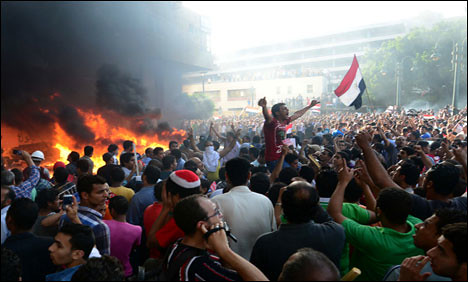
Thousands have taken to the streets throughout Egypt in clashes between supporters and opponents of the Muslim Brotherhood government of Mohamed Morsi. June 30 is a day of portest., a photo by Pan-African News Wire File Photos on Flickr.
How Egypt’s ‘revolution’ betrayed itself
Friday, 12 July 2013 00:00
By Ramzy Baroud
“THE revolution is dead. Long live the revolution,” wrote Eric Walberg, a Middle East political expert and author, shortly after the Egyptian military overthrew the country’s democratically elected president Mohammed Morsi on July 3.
But more accurately, the revolution was killed in an agonisingly slow death, and the murders were too many to count.
Mohamed ElBaradei, a liberal elitist with a dismal track record in service of Western powers during his glamorous career as the head of the International Atomic Energy Agency, is a stark example of the moral and political crisis that has befallen Egypt since the ouster of former President Hosni Mubarak.
ElBaradei played a most detrimental role in this sad saga, from his uneventful return to Egypt during the January 2011 revolution — being casted as the sensible, Western-educated liberator — to the ousting of the only democratically-elected president this popular Arab country has ever seen.
His double-speak was a testament not only to his opportunistic nature as a politician and the head of the Dostour Party, but to the entire political philosophy of the National Salvation Front, the opposition umbrella group for which he served as a co-ordinator.
The soft-spoken man, who rarely objected to the unfair pressure imposed on Iraq during his services as the head of the UN nuclear watch dog, was miraculously transformed into a fierce politician with persisting demands and expectations.
His party, like the rest of Egypt’s opposition, had performed poorly in every democratic election and referendum held since the ouster of Mubarak.
Democracy proved him irrelevant.
But after every failure he and the opposition managed to emerge even louder thanks to a huge media apparatus that operated around the clock in a collective, undying commitment in rearranging the country’s political scene in their favour, regardless of what the majority of Egyptians thought.
Soon after General Abdel-Fattah el-Sissi announced a military coup on July 04, in what was a clearly well-organised conspiracy involving the army, much of the media, the opposition and disaffected Mubarak-era judges, silencing the Muslim Brotherhood and their own media were paramount.
The level of organisation in which the coup conspirators operated left no doubt that the military was most insincere when two days earlier they had given the quarrelling political parties 48 hours to resolve their disputes or else.
But of course there was no room for compromise as far as ElBaradei’s opposition was concerned, and the army knew that well.
On June 30, one year since Morsi had taken office following transparent, albeit protracted elections, the opposition organised with the sinister goal of removing the president at any cost.
Some called on the army, which has proven to be extremely devious and untrustworthy, to lead the “democratic” transition.
ElBaradei even invited supporters of the former regime to join his crusade to oust the Brotherhood.
The idea was simple: to gather as many people in the streets as possible, claiming a second revolution and calling on the military to intervene to save Egypt from Morsi and his supposed disregard of the will of the people.
The military, with a repulsive show of orchestrated benevolence, came to the rescue, in the name of the people and democracy.
They arrested the president, shut down Islamic TV stations, killed many and rounded up hundreds of people affiliated with the ruling party. Fireworks ensued, ElBaradei and his men gloated, for Egypt had supposedly been saved. Except it was not.
“Mubarak-era media owners and key members of Egypt’s liberal and secular opposition have teamed up to create arguably one of the most effective propaganda campaigns in recent political history, to demonize Morsi and the Muslim Brotherhood,” wrote Mohamad Elmasry of the American University in Cairo.
Much of the media in Egypt never truly shifted allegiances. It remained as dirty and corrupt as it was during the Mubarak regime.
It was there to serve the interest of the powerful business and political elites.
But, due to the changing political reality — three democratic elections and two referendums, all won by Islamic party supporters — it was impossible for them to operate using the same language.
They too jumped on the revolution bandwagon using the same frame of references as if they were at the forefront of the fight for freedom, equality and democracy.
Egypt’s reactionary forces managed to survive the political upheaval not for being particularly clever.
They simply had too much room to regroup and manoeuvre since the desperate opposition, ElBaradie and company, put all of their focus on discounting Morsi, undermining the Muslim Brotherhood, and undercutting the democratic process that brought them to power.
Ramzy Baroud is editor of PalestineChronicle.com. He is the author of The Second Palestinian This article is reproduced from Counterpunch
No comments:
Post a Comment